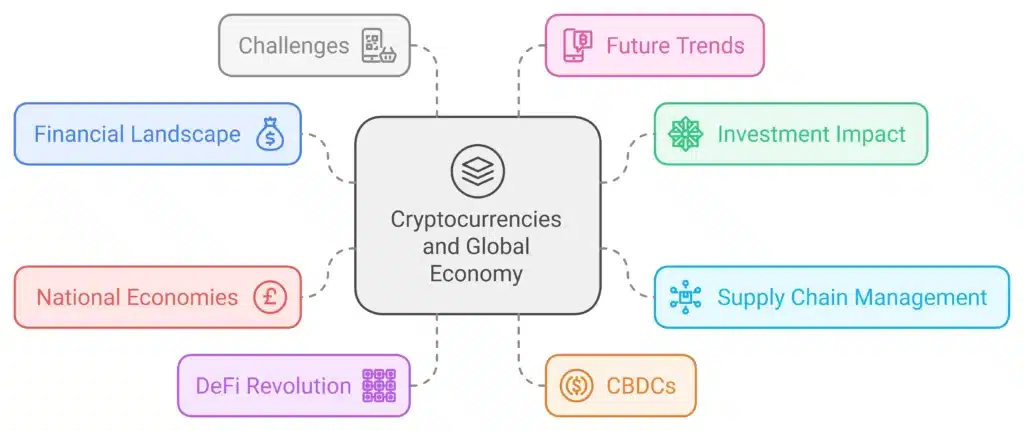Cryptocurrencies are no longer just a niche investment or a tech-savvy experiment—they have become a bona fide financial asset class influencing the global economy. From Bitcoin going mainstream to central banks exploring digital currencies, the rise of cryptocurrencies has both disruptive and catalytic impacts on markets worldwide. But how do these digital assets shape economic trends and industries, and how do we think about money?
This guide will explore how cryptocurrencies influence global economic systems, whether you’re an investor looking to explore new opportunities, a financial analyst tracking global trends, or a tech enthusiast intrigued by blockchain’s potential.
Here’s what we’ll cover:
- A brief overview of cryptocurrencies
- Key ways cryptocurrencies are impacting the global economy
- Opportunities and challenges they present
- What the future of cryptocurrency may look like
What Exactly Are Cryptocurrencies?
At their core, cryptocurrencies are digital or virtual currencies secured by cryptographic technologies. Unlike traditional currencies, cryptos operate decentralized over blockchain networks, immune to government control or manipulation by financial institutions. Bitcoin, the first and most well-known cryptocurrency, debuted in 2009, paving the way for thousands of other cryptocurrencies, including Ethereum, Binance Coin, and Solana.
Key Features of Cryptocurrencies:
- Decentralization: Operates over peer-to-peer networks instead of centralized banks.
- Transparency: Transactions recorded on public blockchains ensure visibility.
- Limited Supply: Most cryptocurrencies have a cap on the number of coins that can be created, ensuring scarcity (e.g., Bitcoin is capped at 21 million coins).
- Borderless Transactions: Cryptos enable frictionless cross-border payments.
- Volatility: Prices fluctuate massively due to speculative investing and evolving regulations.
Now that we have a snapshot of cryptocurrencies let’s examine their influence on the global economy.

Disruptors or Catalysts? How Cryptocurrencies Impact the Global Economy
Cryptocurrencies bring disruption and opportunity to nearly all facets of the modern economy—from financial services and remittances to economic regulations. Here’s how they’re making their mark:
1. Changing the Financial Landscape
Cryptocurrencies challenge the traditional financial system by eliminating intermediaries such as banks and payment processors. Blockchain technology allows for direct, peer-to-peer payments, dramatically reducing transaction fees.
- Cross-border Transactions: Sending money internationally using crypto like Bitcoin or Litecoin is faster and cheaper than traditional bank transfers. Businesses are increasingly using platforms like Ripple for international payments.
- Unbanked Populations: Over 1.4 billion people worldwide remain unbanked. Cryptocurrencies allow these demographics to access financial systems without a traditional bank account.
Example in practice? Emerging economies like Kenya use cryptocurrencies to enable mobile payments through services like BitPesa.
2. Investment Booms and Market Volatility
Cryptocurrencies have opened up new investment possibilities, but their volatility significantly impacts markets.
- Wealth Creation: Investors who got in early with Bitcoin and Ethereum realized jaw-dropping returns. However, this speculative nature also creates market volatility, often spilling over into traditional equity markets.
- Institutional Adoption: Companies like Tesla and Square allocating portions of their balance sheets to Bitcoin signal that cryptocurrencies are becoming mainstream investment assets.
Even with wealth potential, the cryptocurrency market’s speculative and unpredictable nature creates a level of risk that investors cannot ignore.
3. Blockchain’s Role in Supply Chain Management
Beyond digital currencies, blockchain technology—the backbone of cryptocurrencies—is revolutionizing industries like supply chain management.
- Greater Transparency: Companies use blockchain to track products from origin to consumer, eliminating fraud. For instance, IBM’s Food Trust platform utilizes blockchain to trace real-time food safety.
- Efficiency: Smart contracts on blockchain can automate tasks such as inventory restocking or payments upon delivery, reducing delays and errors.
Blockchain in supply chains lowers business costs and bolsters consumer trust through increased transparency.
4. Potential Threats to National Economies
Cryptocurrencies thrive on decentralization, which can challenge governments and central banks responsible for regulating monetary systems.
- Tax Evasion and Illicit Transactions: Cryptocurrencies provide anonymity, making them attractive to legitimate users and illicit actors engaging in tax evasion or illegal activities.
- Threat to Fiat Currencies: Widespread crypto adoption may undermine national currencies, especially in countries with weak fiat systems.
For example, El Salvador became the first country to adopt Bitcoin as legal tender, an ambitious and controversial decision. Critics fear it could destabilize the country’s fragile economy.
5. Decentralized Finance (DeFi) Revolution
Decentralized finance (DeFi) offers traditional financial services—lending, borrowing, and trading—on decentralized blockchain platforms without intermediaries.
- Access to Capital: Users can borrow crypto assets instantly from DeFi platforms like Aave without traditional credit checks.
- Innovation in Financial Products: DeFi platforms offer staking, yield farming, and liquidity pools, allowing investors to earn passive income.
DeFi markets now hold billions in total value locked (TVL), signaling the rapid growth and interest in decentralized financial infrastructures.
6. Emerging Role of CBDCs (Central Bank Digital Currencies)
Responding to cryptocurrencies, central banks worldwide are exploring Central Bank Digital Currencies (CBDCs). CBDCs are government-issued digital currencies tied to a nation’s fiat currency but function using blockchain technology for security and efficiency.
- China’s Digital Yuan: Launched as one of the first CBDCs, it’s designed to modernize payments while maintaining state control over the monetary system.
- Financial Stability: Unlike decentralized cryptos, CBDCs aim to offer stability while leveraging blockchain efficiencies.
Governments developing CBDCs could change the global adoption rates of cryptocurrency and provide a potential counter to financial instability.
Challenges of Cryptocurrencies in the Global Economy
While cryptocurrencies offer immense potential, there are still hurdles that need addressing:
- Regulation and Compliance: Varying regulations across countries create confusion and uncertainty for investors and businesses.
- Environmental Concerns: Cryptocurrency mining consumes massive amounts of electricity. Bitcoin alone consumes more energy annually than Argentina.
- Security Risks: Despite blockchain’s security, crypto thefts and scams still occur, often targeting exchanges or individuals unaware of phishing tactics.
Resolving these challenges is crucial for cryptocurrencies to gain legitimacy and broader adoption.
What Does the Future Hold for Cryptocurrencies?
Predicting the future of cryptocurrencies comes with uncertainties, but specific trends seem inevitable:
- Mainstream Adoption: Cryptocurrencies like Bitcoin may increasingly coexist with fiat rather than replace them.
- Regulatory Frameworks: Governments will likely introduce standardized regulations to increase trust and control.
- Broader Applications: Blockchain’s use cases extend beyond currencies, potentially revolutionizing healthcare, real estate, and voting systems.
For investors, financial analysts, and tech enthusiasts, staying informed about cryptocurrency trends can help capitalize on emerging opportunities while navigating risks.
Take Control of Your Financial Future
Cryptocurrencies are reshaping the global economy, offering innovation and disruption in equal measure. Whether leveraging Bitcoin for investments, exploring DeFi, or tracking the development of Central Bank Digital Currencies (CBDCs), the crypto revolution is here to stay.


